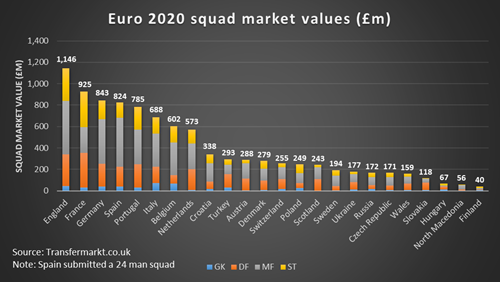England’s squad at this summer’s European Championships is the most valuable in the tournament according to research by GIS' Chris Winn – totalling a whopping £1.1bn.
As the only squad at Euro 2020 – which kicks off this week – to top the £1bn mark, the squads value is led by captain Harry Kane and winger Jadon Sancho, valued at £108m and £90m respectively.
Using transfermarkt.co.uk Chris, football finance academic at GIS and former co-author of the Deloitte Football Money League, has gone through all 24 squads to determine the value of each team. Topping the European rankings is Frenchman Kylian Mbappé, worth a staggering £144 million, while Harry Kane comes in second as the only other player worth over £100 million. Jadon Sancho may only be England’s second most valuable player but he is the tournament’s third, at only 21 years of age. Overall, approximately £9.5bn of playing talent has been included in the 24 squads for the tournament.

After Gareth Southgate’s England squad, France carry the next highest cumulative market value of £925m, with Germany, Spain and Portugal making up the remainder of the top five - despite Spain only registering a 24-man squad. The top eight squads by market value have a cumulative market value of £6.4bn- meaning the top third of squads make up two thirds (67%) of the total market value on show.
With France, Germany and Portugal all in Group F, this is by far the greatest concentration of market value in the group stages- £2.6bn, that being 28% of total player market value in the tournament. In contrast, Finland carry the smallest squad market value (£40m), followed by North Macedonia (£56m) and Hungary (£67m).
Per UEFA’s player classifications, England’s midfield positions carry the greatest market value amongst all the squads (£500m), though France come out on top in the defensive and forward positions (£322m and £332m), the latter largely due to a market valuation of £144m for Kylian Mbappé as per Transfermarkt.
Whilst football is about far more than player market values, we decided to play out a hypothetical scenario where market value wins throughout, as applied to the competition’s group and knock out stages:

Commenting on the wider implications of these statistics, Chris, who is the programme leader for GIS’ MSc Football Business course, said: “Like all summer tournaments, the delayed Euro 2020 competition provides many players with a platform to showcase their talents, especially with several of English and wider European football’s star names linked with big money moves this summer.”
He adds: “With fans gradually returning to games and a slowly increasing sense of certainty regarding future cash flows as opposed to last summer, we may see an increased level of gross transfer expenditure in England’s top flight this summer, albeit still with an element of caution. As such, the Premier League’s summer gross transfer spend record of c.£1.5bn recorded in 2017 will be unlikely to be surpassed this time round.”

















